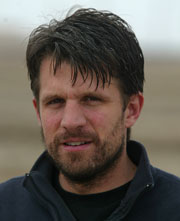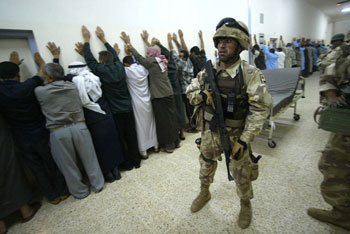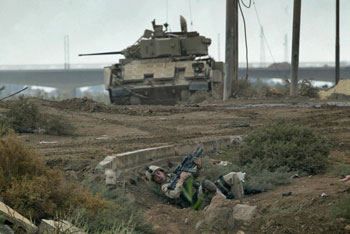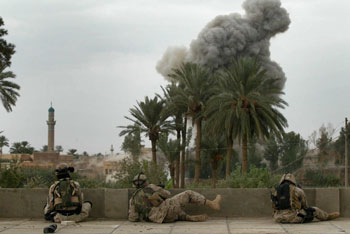 |
 | |||||||||||||
The Battle for Falluja
December 2004
|
 |
||||||||||||
|
We drove into Falluja the night before the invasion. I was with a reporter from the New York Times in a seven-ton truck filled with Iraqi Commandos and US Special Forces soldiers. The seven-tons are basically large open topped utility vehicles used primarily by the Marines with panels that extend to about your waist. Not exactly ideal transport for driving around Falluja at midnight given the number of roadside bombs in Iraq and the fact that everyone in the province was braced for the onslaught of 10,000 soldiers to descend upon the city.
The soldiers were operating with fairly liberal rules of engagement. We passed a couple of burning vehicles on the way into town that advance teams had shot up for fear of car bombs, and scouts in the rear of our convoy took out four insurgents trying to plant IEDs in the road.
The Commandos' objective was to take the hospital before the big push to Falluja kicked off the following day. According to the military, the hospital was seen as a refuge for insurgents but also turned out to be a political nightmare after US forces entered the city in April with casualty figures well over 700 and pictures of wounded civilians flashed around the world daily on Arabic news stations.
The operation lasting only a couple hours went off fairly successfully. The American soldiers said they netted about five people suspected of being foreign fighters. The only casualty was an Iraqi Commando who discharged his weapon, accidentally shooting himself in the foot.
I was told about 3am to expect a barrage of 500lb bombs to bombard the city. I waited for a couple of hours on the roof of a building where snipers had been set up. Tracer fire and explosions raced across the sky and lighting bolts flashed in the distance. After talking with some of the spotters it was apparently decided the air attack might be put on hold and I climbed down back into the hospital for a couple hours of sleep.
Already sleeping in the corridor of the hospital were a couple of dozen Iraqi commandos huddled in one corner in their chocolate chip uniforms and a dozen or so SF soldiers leaning up against the walls in one of the hallways. Around 5 or 6 in the morning we woke up as the hospital shook.
It was daybreak and the battle for Falluja had begun. Marines with the 3rd LAR and US army soldiers moved to the Euphrates river to the West of the city and were in the opening salvo of an intense 6-hour battle with insurgents on the opposite side of the river. Well over 200 Marines and Army soldiers had staked out positions all along the river front and were bombarding insurgent positions across the Euphrates with tanks, Bradley's, Humvees loaded with 50 Cal's, mini guns and artillery.
The US soldiers are clearly eager to get into the fight but the Iraqi Commandos don't seem to want to have any part of it. The Commandos, most of whom have flashlights duck-taped to AK-47's for the night mission, have accomplished their main objective and prefer the safety of the hospital walls.
Although Falluja was never the friendliest place in Iraq I can't help think that less than a year ago foreign journalists could frequent this city for day pictures, or for no other reason than to have a look around. Although the city was generally more tense than other places in Iraq, several times my colleagues and I wound up in people's home for lunch or tea. But now it seems like ages ago.
I photograph US soldiers on the ground for several hours weaving between the relative safety of a brick wall and some of the vehicles positioned along the bank of the river. Many of the soldiers are young, the majority probably aren't even 25.
One of the Special Forces soldiers yells to me to follow him to the roof of a building for a better view. Through a grove of palm trees on the bank of the river we see the minarets of mosques poking through the western portion of the city that is now mostly destroyed. Below us is the metal bridge where Western contractors were hung earlier this year by an enraged mob. On the roof of the building US snipers have set up positions to try and take out insurgents hiding in the rubble about 500 meters away, something the relentless bombing has not seemed to accomplish.
After shooting for a while one the soldiers gets a call ordering everyone off of the roof of the building. One by one each of the guys makes a run for the ladder. About 20 minutes later a mortar lands where we had been crouching, taking out the left corner of the building. Luckily everyone got off the roof in time.
Down below the battle rages on for several more hours with neither side relenting. Eventually we're told to mount back onto the trucks.
One of the Special Forces soldiers thanks a Marine commander 'for letting us play' and we drove back to their makeshift base. As we pull into the compound the tension begins to ease and the Iraqi Commandos celebrate the success of their mission or at least the fact that everyone in their group survived.
The battle for Falluja had begun.
© Shawn Baldwin
Dispatches are brought to you by Canon. Send Canon a message of thanks. |
|||||||||||||
Back to December 2004 Dispatches
|
|




